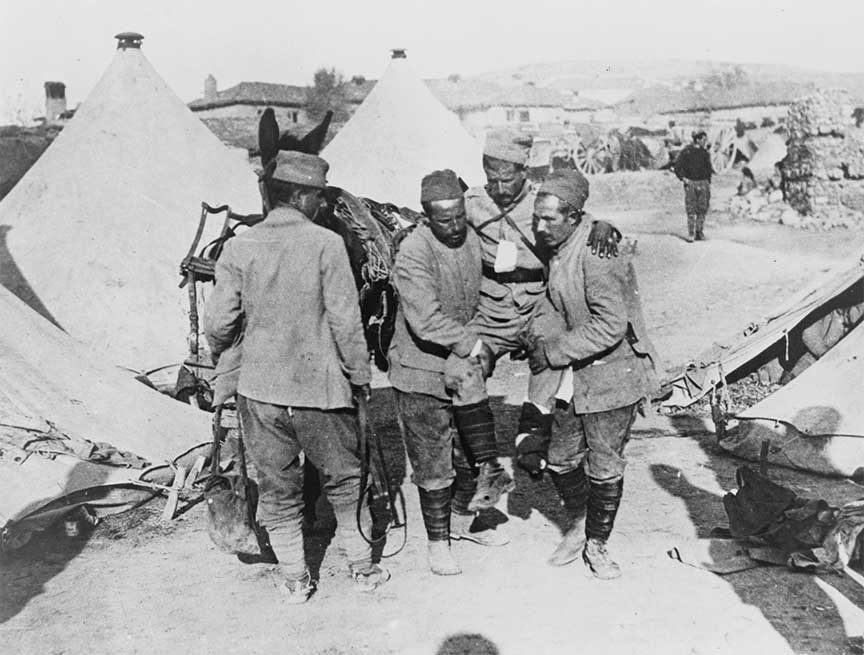Austria Declares War on Serbia

Serbian Troops
In the aftermath of the assassination of Archduke Ferdinand, Austria made ten demands of Serbia. These included: the suppression of all publications critical of Austria-Hungary and the withdrawal of schoolbooks filled with propaganda against the Empire. Army officers, school teachers and government officials holding these views would have to be dismissed. Specific individuals would be targeted for arrest. Finally, an Austrian official would be appointed to monitor the fulfillment of these demands. The Serbians accepted all but the last demand. When the Serbs refused to accept all the demands the Austrians declared war on Serbia on July 28, 1914.
In the aftermath of the assassination of Archduke Ferdinand, the Austrian government received a secret report which concluded that the Serbian government had nothing to do with the murder. Despite that report, the Austrians were determined to extract a price from Serbia for the act. Many welcomed a war to add Serbia to the Empire.
After debating the course of action for a week on July 23, 1914, the Austrians delivered an ultimatum to the Serbs. It contained ten demands:
1. to suppress every publication which shall incite to hatred and contempt of the Monarchy, and the general tendency of which shall be directed against the territorial integrity of the latter;
2. to proceed at once to the dissolution of the Narodna Odbrana to confiscate all of its means of propaganda, and in the same manner to proceed against the other unions and associations in Serbia which occupy themselves with propaganda against Austria-Hungary; the Royal Government will take such measures as are necessary to make sure that the dissolved associations may not continue their activities under other names or in other forms;
3. to eliminate without delay from public instruction in Serbia, everything, whether connected with the teaching corps or with the methods of teaching, that serves or may serve to nourish the propaganda against Austria-Hungary;
4. to remove from the military and administrative service in general all officers and officials who have been guilty of carrying on the propaganda against Austria-Hungary, whose names the Imperial and Royal Government reserves the right to make known to the Royal Government when communicating the material evidence now in its possession;
5. to agree to the cooperation in Serbia of the organs of the Imperial and Royal Government in the suppression of the subversive movement directed against the integrity of the Monarchy;
6. to institute a judicial inquiry against every participant in the conspiracy of the twenty-eighth of June who may be found in Serbian territory; the organs of the Imperial and Royal Government delegated for this purpose will take part in the proceedings held for this purpose;
7. to undertake with all haste the arrest of Major Voislav Tankosic and of one Milan Ciganovitch, a Serbian official, who have been compromised by the results of the inquiry;
8. by efficient measures to prevent the participation of Serbian authorities in the smuggling of weapons and explosives across the frontier; to dismiss from the service and to punish severely those members of the Frontier Service at Schabats and Losnitza who assisted the authors of the crime of Sarajevo to cross the frontier;
9. to make explanations to the Imperial and Royal Government concerning the unjustifiable utterances of high Serbian functionaries in Serbia and abroad, who, without regard for their official position, have not hesitated to express themselves in a manner hostile toward Austria-Hungary since the assassination of the twenty-eighth of June;
10. to inform the Imperial and Royal Government without delay of the execution of the measures comprised in the foregoing points.
Although the demands were extreme, the Serbian government knew that they could not hold out against the Austrian Army and thus responded accepting 14 of the demands, just requesting that instead of the Austrians an international Court try the assassins. The Austrians rejected that, as they rejected a Russian suggestion that negotiations should begin based on Serbian acceptance of 14 of the 15 demands. The Austrians rejected that as well, they were determined to go to war. On July 28th they declared war on Serbia
 >
>